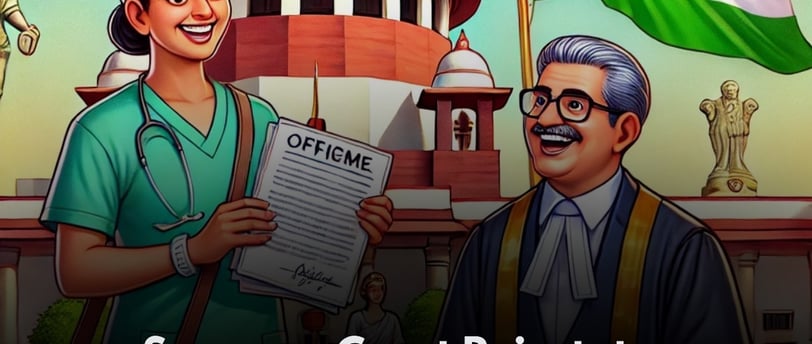Supreme Court Reinstates Wrongfully Terminated Para-Medical Employee, Directs Payment of Service Benefits
In a significant ruling, the Supreme Court of India reinstated a former Para-Medical Ophthalmic Assistant, Basudev Dutta, who was terminated by the West Bengal government in 2011 after 26 years of service. The court overturned a decision by the Calcutta High Court, which had upheld his termination based on a police verification report declaring him "unsuitable" for government service.
12/8/20241 min read


The controversy stemmed from Dutta's citizenship status, which was questioned despite him possessing a migration certificate, voter ID, Aadhaar card, and tax records. The appellant argued that his migration from East Pakistan (now Bangladesh) in 1969 along with his father, who held a valid migration certificate, established his Indian citizenship. The Supreme Court acknowledged these claims, emphasizing that his dismissal violated principles of natural justice.
Dutta's ordeal began in 2010 when a secret police verification report, submitted 25 years after his appointment and just two months before his retirement, labeled him unsuitable for his role. Without furnishing the report or granting him a personal hearing, the health department terminated his services in 2011. Although the West Bengal State Administrative Tribunal annulled the termination in 2012, the state government appealed, resulting in a reversal by the Calcutta High Court in 2023.
In its judgment, the Supreme Court underscored several procedural lapses and highlighted the importance of adhering to natural justice. It found that the termination order lacked transparency and sufficient reasoning, rendering it arbitrary and illegal. The court criticized the authorities for their undue delay in submitting the police verification report and the failure to provide Dutta a fair opportunity to contest the allegations.
Reinstating the tribunal's 2012 order, the court declared Dutta's termination unsustainable. It directed the government to disburse all unpaid service benefits, including pension, gratuity, and salary arrears, within three months. The ruling also called for systemic reforms, mandating all states to complete police verifications for government appointees within six months of their appointment to prevent similar delays.
The court's decision restores Dutta's service benefits and addresses procedural injustices while establishing a precedent for timely and fair administrative actions. This ruling reiterates the judiciary's role in upholding constitutional rights and safeguarding employment security against arbitrary actions.
